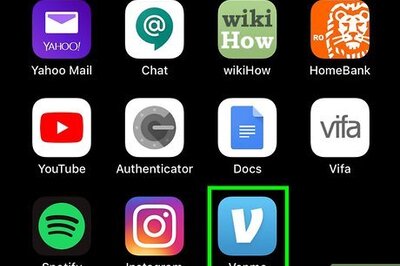
views
Relieving Brain Freeze

Recognize the symptoms. Brain freeze is a painful sensation that occurs when a cold substance touches the back of your throat and the surrounding blood vessels constrict rapidly in response. When the blood vessels begin to dilate again, they activate the trigeminal nerve, which controls sensation to much of the face. This can feel like a sharp or stabbing pain in the sinuses or forehead. Brain freeze will subside on its own within a few minutes. The mechanism that causes brain freeze has also been linked to migraines. If your headache doesn’t go away after 5-10 minutes, or if you get brain-freeze-type pains without consuming cold things, consider seeking medical treatment.

Remove the offending substance. If you just chugged a frozen Coke or bit into an ice pop and were rewarded for your efforts with brain freeze, the first thing to do is stop consuming the cold stuff.

Warm the roof of your mouth with your tongue. You can relieve brain freeze pain by quickly warming the roof of your mouth (also referred to as the soft palate and hard palate; the hard palate is the part with bone, and the soft without) after it's already been cooled. If you do this soon enough, you may be able to ease the surge of blood flow to your brain. Touch your tongue to your soft palate. If you can roll your tongue in a ball, press the bottom of your tongue to the roof of your mouth. The underside of your tongue may be warmer than the top side (which was probably cooled by the Slurpee you just chugged.) Some people find that firmly pressing your tongue against the roof of the mouth alleviates brain freeze, so try applying extra pressure!

Drink a warm liquid or plain warm water. The beverage doesn’t have to be extremely hot, it just needs to be at room temperature or above to restore your mouth’s normal temperature. Sip the liquid slowly and swish it around your mouth a bit. This will warm up your palate.

Make a mask with your hands to cover your mouth and nose. Breathe quickly into your cupped hands. This will trap your warm breath and raise the temperature inside your mouth.

Press a warm thumb against your palate. Obviously, make sure your hands are clean before you do this, but since your body temperature is much higher than the temperature inside your suddenly-freezing mouth, the warm contact may help relieve the pain.

Wait it out. The brain freeze will usually pass on its own within 30-60 seconds. Sometimes the shock of the brain freeze makes it seem worse than it really is, but if you expect it and know that it'll come and go, it doesn't have to be a traumatizing experience.
Preventing Brain Freeze

Understand what causes brain freeze. Surprisingly, scientists still don’t know exactly what causes brain freeze, but recent research has given them some very solid theories. Two mechanisms seem to be at work in your mouth when something extremely cold is unexpectedly introduced. (Remember, your body temperature is around 98.6°F, but the ideal serving temperature for ice cream is around 10°F!). When you quickly consume a very cold substance, it unexpectedly and swiftly changes the temperature in the back of your throat where your internal carotid artery and your anterior cerebral artery meet. This temperature change causes a rapid dilation and constriction of these arteries, and your brain interprets this as pain. When the temperature in your mouth plummets unexpectedly, your body quickly dilates blood vessels in the area to ensure a steady flow of blood (and warmth) to the brain. Your anterior cerebral artery (which is located in the middle of your brain, right behind your eyes) expands to carry this blood into your brain. This sudden expansion of the artery and influx of blood can cause a spike in skull pressure, leading to a headache sensation.

Prevent cold food from touching the roof of your mouth. Obviously, you're not going to give up cold foods just so that you can avoid brain freeze. Rather, let the bite or sip warm on your tongue before you let the substance touch the roof of your mouth. If you’re eating ice cream, use a spoon and angle it so that the ice cream doesn’t hit the roof of your mouth. Avoid straws when drinking cold beverages if possible. Slurping a milkshake through a straw could be your ticket to brain freeze. If you have to use a straw, angle it away from the roof of your mouth.

Consume cold foods and drinks slowly and in small bites. Chugging cold beverages or eating half an ice cream cone in one bite may be fun, but it also makes you much more likely to succumb to brain freeze. One explanation for this is that eating more slowly keeps the cold from overwhelming the blood vessels in your mouth with sudden temperature changes.

Take a break from the cold. If you feel a brain freeze coming on, or if your mouth feels very cold, take a break from the food or beverage for a minute to allow your palate to warm up again.




















Comments
0 comment